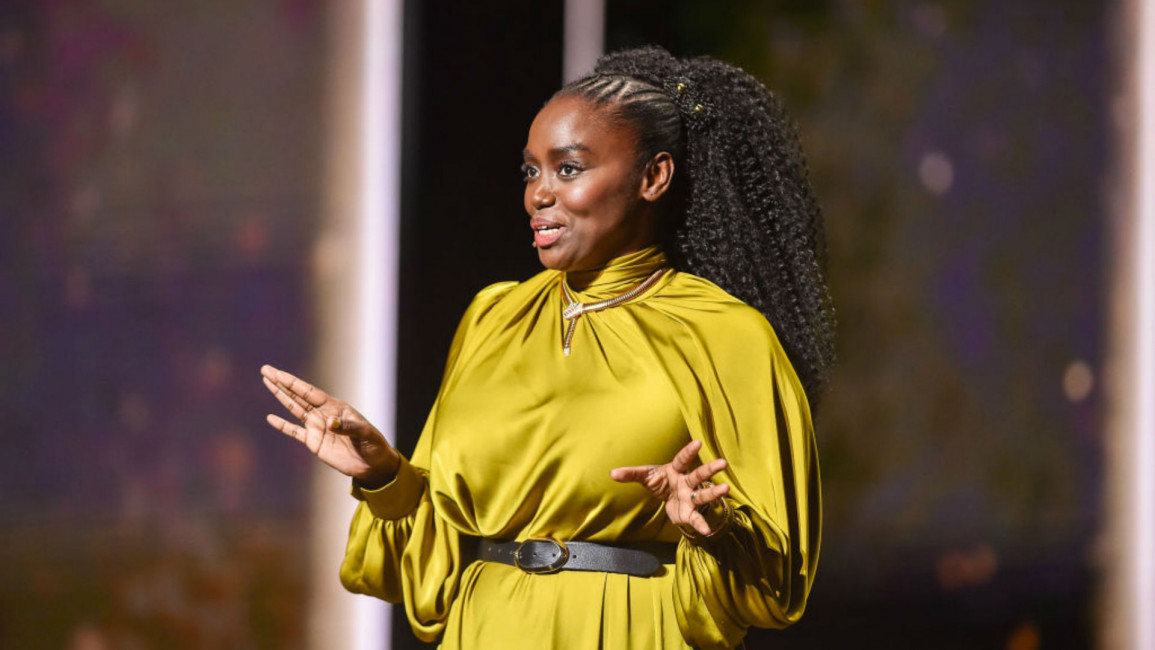
The speech that stunned an all-white French Oscars audience into embarrassed silence
Whether in the US election, the #MeToo movement, or across public institutions, discussion surrounding inclusion of women, and women of colour is now given greater visibility than in the past. It would be tempting to believe that times really are changing. But then something happens, and that feeling is abruptly disrupted.
That was the case at the César awards, aka the French Oscars last Friday, when actor Aïssa Maïga gave a powerful speech on stage about the lack of diversity in French cinema.
"We survived whitewashing, blackface, tons of dealer roles, housekeepers with a Bwana accent, we survived the roles of terrorists, all the roles of hypersexualised girls," stated Maïga, as she urged all those within the film industry to consider their complicity in the invisibility of people of colour. Their response? You could've heard a pin drop.
As the camera spun across the room, famous actors, producers, directors were all seen shifting uncomfortably in their seats, and the Senegalese-born actress received no acclaim for her bold and honest words.
Aïssa Maïga was forcing those sitting in the luxurious surroundings of the awards ceremony, to take a cold hard look at themselves, take responsibility for their role, and not just sit watching radical movements from safely behind a screen, but rather be part of those efforts themselves.
 |
When women, People of Colour and the oppressed make demands for real change, the silence is deafening |  |
How apt that she was presenting the best female newcomer award, won by Algerian-French actress Lynda Khoudri for her role in Papicha, a film about the resistance of women during the Algerian civil war. Yet, the connection between the significance of Papicha, the recognition of a strong female lead played by Khoudri appeared to go unrecognised, and the rallying call made by Maïga fell flat.
An open letter entitled #BlackCesars was signed by actors across French cinema and published just before the awards ceremony, to shed light on the absence of Black, Arab and Asian faces both in front of and behind the camera. But many who signed it still failed to express support for Maïga on the day, and sat silently, awkwardly in their chairs. Lip service once again.
Twitter Post
|
Worse, when convicted rapist and international fugitive Roman Polanski was awarded Best Director, the room behaved as if nothing happened. Very few walked out in disgust (Maïga was one of them), and everything continued as if nothing had happened.
The symbolism of the evening was overwhelming. Polite appeals for support and empty slogans are welcome, but when women, People of Colour (PoC) and the oppressed make demands for real change, the silence is deafening.
Read more: Time's up for 'Papicha': A cinematic battle cry for Algerian women
When they name the problem the discomfort is palpable. When they take charge of their own narrative they, instead become the nuisance.
The erasure and whitewashing of PoC, women, and social struggles is not simply a French problem. In 2015 the #OscarsSoWhite movement also erupted in Hollywood, highlighting the same systematic racism. When people of colour are present in mainstream films, they're often playing a stereotype. And when they make it through at all, they are - more often than not - snubbed at the awards.
While some point out that things are headed in the right direction, given this year's big Oscar winner was South Korean director Bong Joon-ho for his film 'Parasite', an overall look at the nominations shows it to be the exception rather than the rule.
In fact, Joon-ho played with this brilliantly in his response to the entire institution. Refusing to fit the mould, he described the Oscars as "not a big deal" and a "very local" award in the run up to the event. He also gave his acceptance speech in Korean. He was not there to please the court, but to point out that the emperor had no clothes.
Similarly, again to its French counterpart, while much has been said about #MeToo in Hollywood, precious little has changed.
Woody Allen is still welcomed, Harvey Weinstein's collaborators remain unchallenged, and the power relations in the industry continue to encourage the reproduction of stereotypical, hyper-sexualised, and two-dimensional portrayals of women.
The truth is, that while it can be fashionable to make the right noises when it comes to liberation politics, women and People of Colour continue to be very lonely in high places when push comes to shove. Diversity in cinema might be positive, but it does little to shake the power structures that control cultural production and the industry.
After giving her speech and walking out over the celebration of Polanski, Aïssa Maïga joined the feminist protestors outside the awards ceremony.
 |
Women and People of Colour continue to be very lonely in high places when push comes to shove |  |
She was, again, showing the way. There is little point replaying over and over the rhetorical postures about inclusion and diversity in the sphere of representation alone. The issue is not just how women and People of Colour are represented. It is that these representations reflect the real material power relations that keep us down in our everyday lives.
The struggle then is on the streets, in the workplaces, and with the uprisings across the globe. When Hollywood or the French film industry start taking us seriously, it will probably be a sign that the world outside their gilded halls is changing for the better, under the pressure of our collective struggles.
Until then, may they long be made to feel uncomfortable when reminded of a simple fact: their world is coming to an end.
Malia Bouattia is an activist, a former president of the National Union of Students, and co-founder of the Students not Suspects/Educators not Informants Network.
Follow her on Twitter: @MaliaBouattia
Opinions expressed in this article remain those of the author and do not necessarily represent those of The New Arab, its editorial board or staff.




